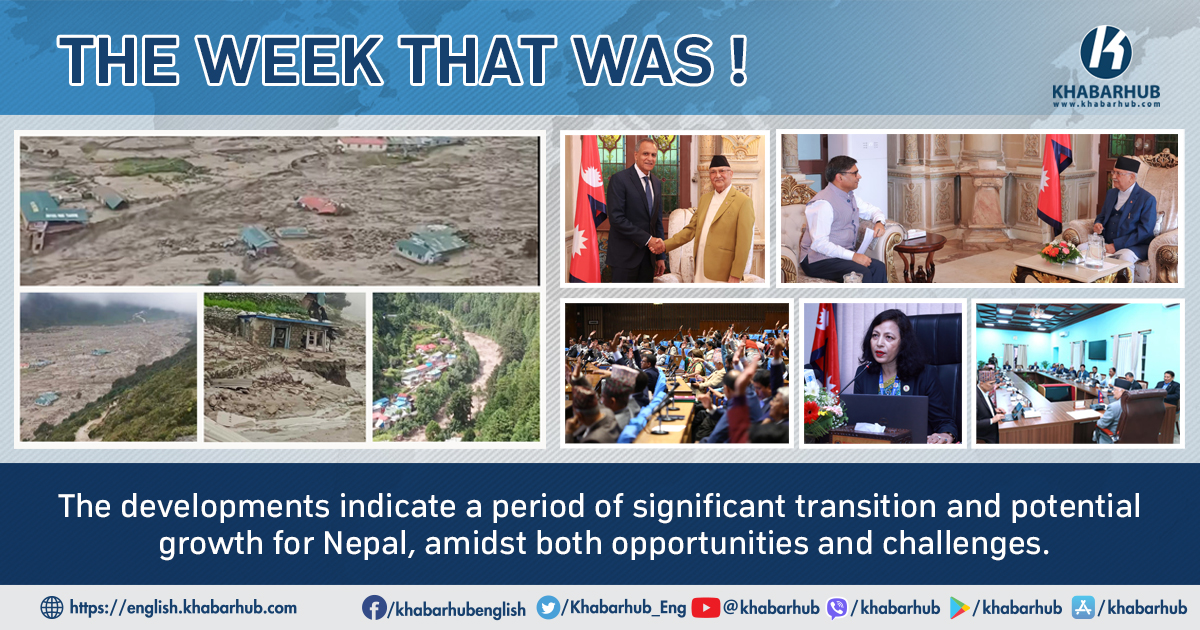KATHMANDU: Last week’s events in Nepal illustrate significant political, diplomatic, and environmental dynamics.
The passage of the TRC Bill and the various high-level visits underscore ongoing efforts to address past grievances, strengthen international partnerships, and enhance regional cooperation.
The administrative reshuffles and strategic actions in the aviation sector reflect attempts to improve governance and infrastructure.
Meanwhile, the environmental challenges faced in Thame highlight the urgent need for effective climate change mitigation and adaptation strategies.
Overall, these developments indicate a period of significant transition and potential growth for Nepal, amidst both opportunities and challenges.
Passage of the TRC Bill
The House of Representatives’ passage of the Transitional Justice Bill, also known as the Third Amendment to the Truth and Reconciliation Commission (TRC) Act, represents a significant milestone in Nepal’s transitional justice process.
Proposed by Minister Ajay Kumar Chaurasiya, this Bill amends the Disappeared Persons Inquiry, Truth and Reconciliation Commission Act, 2014.
The unanimous approval, except for Prem Suwal of the Nepal Majdoor Kisan Party, underscores a broad consensus on advancing the peace process as outlined in the Comprehensive Peace Accord (CPA) of 2006.
This move is aimed at addressing unresolved issues related to past human rights abuses and is a critical step towards achieving long-term peace and reconciliation in Nepal.
US Deputy Secretary of State Richard R. Verma’s Nepal visit
Deputy Secretary Richard R. Verma’s visit to Nepal highlighted the ongoing commitment of the United States to strengthen bilateral relations.
The discussions with government authorities, among others covered a range of topics including economic development, women’s empowerment, energy, and people-to-people ties.
This visit reflected the broader U.S. strategy to support regional stability and development while fostering deeper ties with Nepal.
His subsequent visit to India also signified a broader regional engagement strategy, aiming to reinforce the U.S.-Indian partnership on global issues like climate change, clean energy, and education.
Indian Foreign Secretary Misri’s Nepal visit
Foreign Secretary Vikram Misri’s visit last week emphasized India’s continued investment in its relationship with Nepal.
This visit aligned with India’s “Neighborhood First” policy, focusing on enhancing bilateral cooperation through infrastructure projects and other collaborative ventures.
Discussions during this visit focused on building on the solid foundations of existing ties, furthering cooperation in various sectors.
The visit also underlined India’s commitment to addressing regional concerns and strengthening its diplomatic and economic presence in Nepal.
President Paudel’s call for climate change collaboration
During his meeting with Indian Foreign Secretary Misri, President Ram Chandra Paudel highlighted the importance of bilateral cooperation in addressing climate change.
This underscored Nepal’s recognition of the urgent need for regional collaboration to mitigate the impacts of climate change, which is crucial given the vulnerabilities of the Himalayan region to environmental changes.
This emphasis on climate cooperation reflected broader regional concerns and the necessity for joint efforts to manage and adapt to environmental challenges.
Madhes Province Cabinet Reshuffle
Chief Minister of Madesh Province Satish Kumar Singh’s decision to dismiss eight State Ministers was a response to criticism regarding the cabinet’s size and efficiency.
This move aimed to streamline governance and address concerns about the cabinet’s effectiveness.
The reshuffle, reducing the number of ministers to 12, is part of a broader strategy to enhance administrative efficiency and respond to political and public pressures regarding governance practices in Madhesh Province.
Action Plan for Pokhara and Gautam Buddha International Airports
The government’s approval of an action plan for Pokhara and Gautam Buddha International Airports, including waivers on various fees, represented a strategic move to boost the operational capacity of these airports.
The concessions are intended to encourage more traffic and optimize airport operations, crucial for enhancing Nepal’s connectivity and economic development.
This plan is part of a broader effort to strengthen Nepal’s infrastructure and support its growing aviation sector.
Sudurpaschim Province Chief Minister’s Vote of Confidence
Chief Minister Kamal Bahadur Shah securing a vote of confidence last week demonstrated his continued political stability and support within the provincial assembly.
The strong majority in favor underscored a solid backing from a broad coalition of lawmakers, which is vital for maintaining effective governance and implementing policy agendas in Sudurpaschim Province.
Recommendation of Sewa Lamsal as Nepal’s Ambassador to Belgium
The recommendation of Sewa Lamsal, currently Secretary of the Ministry of Foreign Affairs, to serve as Nepal’s Ambassador to Belgium marks a significant appointment.
As the first female Secretary, Lamsal’s elevation reflects ongoing efforts to promote gender diversity and strengthen Nepal’s diplomatic presence in Europe.
The potential appointment of Amrit Rai as acting Secretary indicates a continuity in leadership and administrative stability within the Ministry of Foreign Affairs.
Impact of Rapid Ice Melting in Thame
The rapid ice melting in Thame, leading to floods and landslides, underscored the pressing issue of climate change and its tangible impacts on Nepal’s mountainous regions.
The destruction caused by accelerated snowmelt highlighted the need for urgent climate action and improved disaster preparedness.
The formation of new lakes and the destruction of permafrost formations are indicators of changing environmental conditions that require immediate attention and adaptation strategies.









Comment